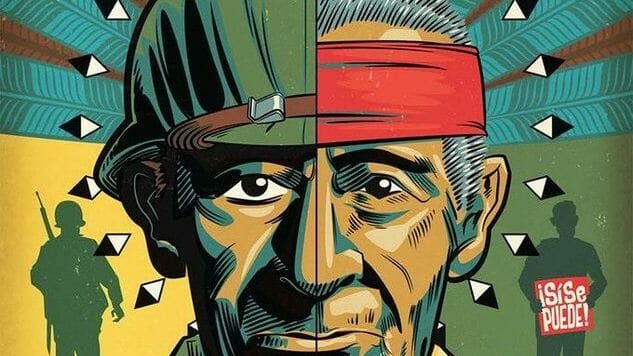In His Own Words: La Voz De M.A.Y.O. Tata Rambo Writer Henry Barajas on Preserving Latinx Stories
Art by Jason “Gonzo” Gonzales
As part of Paste Comics’ ongoing efforts to spotlight worthy Kickstarter projects, particularly from marginalized creators, we’ve invited writer Henry Barajas to contribute a guest essay to mark the launch of his campaign for the first issue of La Voz De M.A.Y.O. Tata Rambo, his new project based on the life of his great-grandfather.

La Voz De M.A.Y.O. Tata Rambo Cover Art by Jason “Gonzo” Gonzales
I hosted a “Representation Matters: How to Write POC & LGBTQIA” characters at New York Comic Con in 2017. I introduced myself as Henry Barajas, a journalist and comics professional, who’s working on a comic about his great-grandfather’s political activism in the early 1970s. There were a number of attendees who approached me asking when they can read it—I’m happy to report it’s set to hit digital shelves on Columbus Day.
All my life, I was told my great-grandfather Ramon Jaurigue was a good man and did good things. When I think of him, I see him beaming like a Christmas tree being plugged in for the first time. Earlier this year, we drove to his first peaceful gathering, organized to keep a Mexican migrant family together. It was just like the old days, when my great-grandfather—who I came to know as Tata Rambo—helped form a group of people to stop the city of Tucson from displacing thousands of families to build a freeway through the Yaqui people’s land. Nearly 40 years later, he’s still down for some civil protest.
Stopping the freeway was one of the many things he and the group helped accomplished with the Yaquis. They lobbied the city to build sidewalks and parks, and to install streetlights and plumbing. He was instrumental in starting a low-cost health clinic we know as El Rio near the reservation to help with the drug addiction crisis and get women access to safe abortions and contraceptives. Ramon also became the director of the adult education department in the neighborhood elementary school, to help find jobs for folks who didn’t get to have a proper education.

La Voz De M.A.Y.O. Tata Rambo Interior Art by Jason “Gonzo” Gonzales
Sadly, this was all oral history and none of his accomplishments were documented or remembered in Yaqui history books. This didn’t sit well with me. I grew up to become a reporter for the Arizona Daily Star and Tucson Weekly, despite not having a journalism degree and barely escaping high school with passing grades. I spent three years writing stories about the amazing people in Old Pueblo. It wasn’t until 2015 when I realized I needed to figure out my background. I couldn’t sleep well knowing that Ramon’s accomplishments would go forgotten. I started to write a book about what I can prove and what I learned from surviving Mexican, American, Yaqui, and Others (M.A.Y.O.) organization members. Then I read March by John Lewis, Andrew Aydin and Nate Powell. It was at that moment that my time as a journalist and my indie-comic-writer spirit came together to attempt to tell a story half as good as the ones that inspired me.
-

-

-

-

-

-

-

-

-

-

-

-

-

-

-

-

-

-

-

-

-

-

-

-

-

-

-

-

-

-

-

-

-

-

-

-

-

-

-

-














































